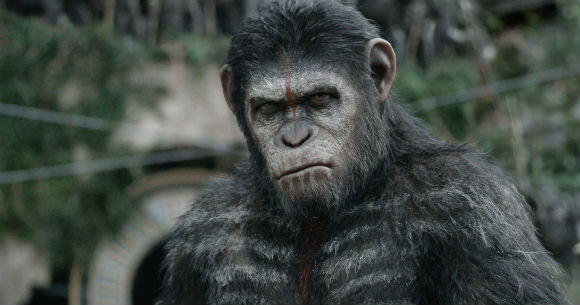Dawn of the Planet of the Apes

Andy Serkis as Caesar in Twentieth Century Fox Film Corp's DAWN OF THE PLANET OF THE APES.

Andy Serkis as Caesar in Twentieth Century Fox Film Corp’s DAWN OF THE PLANET OF THE APES.
With gorilla gone, will there be hope for man? – Ishmael by Daniel Quinn
A pandemic caused by Gen-Sys Laboratories trials for the not-so-creatively named Alzheimer’s treatment, ALZ-112, resulted in the death of hundreds of millions. San Francisco is bare, save for perhaps a few hundred survivors led by Dreyfus (Gary Oldman playing something other than a maniacal villain). Where RISE OF THE PLANET OF THE APES (2011) left us, DAWN picks up. The central conflict arises when a small team of explorers from Drefyus’ camp, including Malcolm (Jason Clarke) and Ellie (Kerri Russell), happens upon an ape settlement led by the highly intelligent Caesar (Andy Serkis). Caesar was the offspring of the initial test subject for the ALZ-112 trials in the previous film, in which he exhibited unusual intelligence through an unexpected benefit of the drug. Malcolm’s group needs access to a hydropower source that lies within ape territory.
Today, Caesar is the beleaguered head of a tribe already showing beginnings of emergent culture—language, writing and pictorial art. Unlike Daniel Quinn’s deeply introspective work—very poorly adapted into the 1999 feature film, Instinct—director Matt Reeves and a team of writers (Mark Bomback, Rick Jaffa, and Amanda Silver) don’t beat you in the head with idealistic soliloquies deconstructing the whole of intensive agriculture. Instead, the narrative focuses sharply on the complexity with which Caesar and Malcolm attempt to resolve tensions to preserve the future of their respective civilizations.
While the lack of depth in female characters in primate and human society is a concerning aspect of the film, it otherwise tackles character development thoughtfully. Among Caesar’s counsel, introduced to the humans atop horseback evoking images of Alexander the Great’s Companion Cavalry, are Ash, Rocket and Koba (Terry Notary, Doc Shaw and Toby Kebbell). Koba harbors deep resentment of humans—pointing to his scars as examples of “human work”. Parallel to that is Dreyfus’ anguish over the loss of his wife and children. As in life, moral absolutism has no place in this thoughtful narrative. Andy Serkis deserves award recognition for Caesar’s portrayal, displaying through motion-captured performance a leader whose mind is constantly observing and analyzing his options, frequently troubled by uncertainties not the least of which are the uncontrollable elements in his and Malcolm’s camp. War, as Caesar sees it, has already inevitably begun (for reasons I won’t spoil). The astonishing part is not that he sees it, but that he demonstrates forthright his natural ability as a leader—unilaterally taking full responsibility for the war.
An added element of interest, and perhaps a set up for as sprawling a franchise as Arthur P. Jacobs’* original, lies in the dynamics of Malcolm’s and Caesar’s relationships with their respective sons, Alexander (Kodi Smit-McPhee) and Blue Eyes (Nick Thurston). They represent a generation unfettered by societal prejudices toward one another. Judging from the ten years that have transpired since the infection decimated humankind, these children do not know any other world. They never interact directly, but we can see the beginnings of two legacies: Blue Eyes will likely take the mantel of leadership some day; Alexander, immersed in graphic novels, may be the first historian of this new age.
In Ishmael, all but certain to have inspired Mr. Reeves right down to the bookended opening and closing shots, Quinn writes that history is written by the victors. His hypothesis is that the Judeo-Christian mythology of dominionism coincides with the advent of intensive agriculture roughly six thousand years ago because the storytelling is done by those who had obliterated horticultural tribalism. The quote opening this article is a question posed to the reader about the humanity we sacrifice as Takers—unsustainably consuming, recklessly ignorant of the cost, without putting back into the world what resources we’ve abused.
Dreyfus’ failure is more complex than simply his personal loss. It doesn’t occur to him that simply restoring power will not return things to the way they were. My thought after leaving the theater was on Blue Eyes and Alexander, and what path they will choose. Why not, as one of Malcolm’s cohorts point out, take the route of the apes who don’t need any of our technology to survive? What story will they write, what history will they create to pass on to their descendants?
Despite the appearance of studio pressure to jam in at least one violence-pandering action sequence at the story’s climax, the potential for a great follow-up is set up here not with the usual bullshit—a post-credits surprise reappearance of the villain. For once, a solidly entertaining and thoughtful science fiction persuades us around the edges of the story at what kind of future Alexander and Blue Eyes will inherit from Malcolm and Caesar. What history they will create upon which generations of culture will be built? Having recently seen the documentary JODOROWSKY’S DUNE, I wonder if Michel Seydoux was paying close attention to how they might resurrect the greatest story never told now that the industry has figured out how to launch and sustain elaborately developed multi-picture sci-fi franchises. I think Mr. Reeves should expect a phone call from Paris…